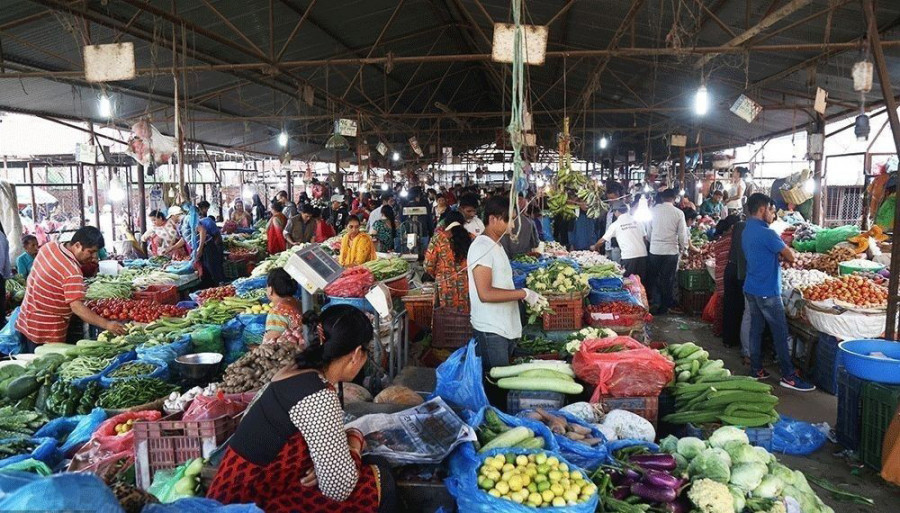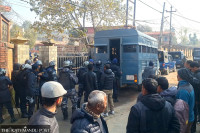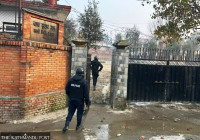Valley
Kathmandu announces plan to monitor market as people find vegetables too costly
Wholesalers say the market price of vegetables is not high as retailers charge.
Anup Ojha
Sumana Karki from Soltimode in Kathmandu has constant worry of late—how to manage food for her six-member family.
In the past few weeks, prices of green vegetables have soared in Kathmandu Valley. Consumers are forced to pay through the nose to buy vegetables. Some can’t afford fresh vegetables due to the rocketing prices.
Karki said she has not purchased tomatoes, after a kilo of it was priced Rs 100. “Even cabbage costs Rs 70 per kg, and you don’t get anything for less than Rs 100 per kg,” said Karki.
Prices are soaring at a time when people have lost their incomes due to the pandemic as authorities have enforced a shutdown. Unscrupulous traders are hiking the prices of vegetables, fruits and essential food items when the city is in the grip of Covid-19. Consumers say the authorities are doing nothing to rein in the prices.
After much public criticism, the Kathmandu Metropolitan City has announced its plan to monitor the market but consumer rights groups don’t readily believe the authorities will be able to bring down the prices.
A meeting on Tuesday chaired by the municipal market inspection committee chief Hari Prabha Khadgi, the deputy mayor, announced that a strict monitoring mechanism would be reactivated across the city from this week.
“We are working with all stakeholders to carry out an inspection,” Khadgi told the meeting also attended by the officials from the Department of Food Technology and Quality Control, Nepal Chamber of Commerce and consumer rights activists.
Consumer rights groups have welcomed the move, but have doubts about its effective implementation.
“The constitution of Nepal empowers all local units to draft their own Local market Management Act but the Kathmandu city lacks it,” said consumer right activist Jyoti Baniya, who chairs the Forum for Protection of Consumer Rights-Nepal.
According to Baniya, eleven municipalities including Kaliya Sub-metropolitan city, Damak Municipality, Bhimeshwor Municipality, Waling Municipality, Tansen Municipality, Birendranagar Municipality, Tikapur Municipality and Itahari Municipality have their own local market monitoring Acts.
Although the Cabinet approved the ‘Orders to ensure quality and standard of foods’ in the first week of August, it has not been used to maintain the quality of food items.
Binaya Shrestha, deputy director of the Kalimati Fruits and Vegetable Market Development Board, said the price of vegetables is high since it's the off-season and the import of green vegetables from India is restricted due to the fear of Covid-19 transmission.
“But we don’t think there is an inadequate supply of vegetables in the Valley,” said Shrestha. “There might be some middlemen taking advantage of this difficult situation.” He suggested that customers look at the board’s website before going out to buy vegetables from nearby shops.
Shrestha expressed the board’s readiness to assist the city in market inspection if they are invited to help.
When the Post contacted a few wholesalers in Kalimati and Balkhu markets, they said wholesale prices are not high compared to what retail shops are charging.
“The cost of tomato has not crossed Rs 60 per kilogram and bitter gourd is available for Rs 45 per kg but we have heard retailers are selling them for over Rs 100 per kg,” said Arjun Dhungana, a vegetable wholesaler in Balkhu, Kathmandu.
“The government has set a time limit for buying goods. Local traders are taking advantage as customers don’t have much choice,” said Dhungana, who supplied vegetables free of charge to needy people during the four-month long nationwide lockdown.
“The prices of green vegetables are like gold. You don’t feel like buying anything especially when you hear the price,” Karki said.




 20.12°C Kathmandu
20.12°C Kathmandu.jpg)












